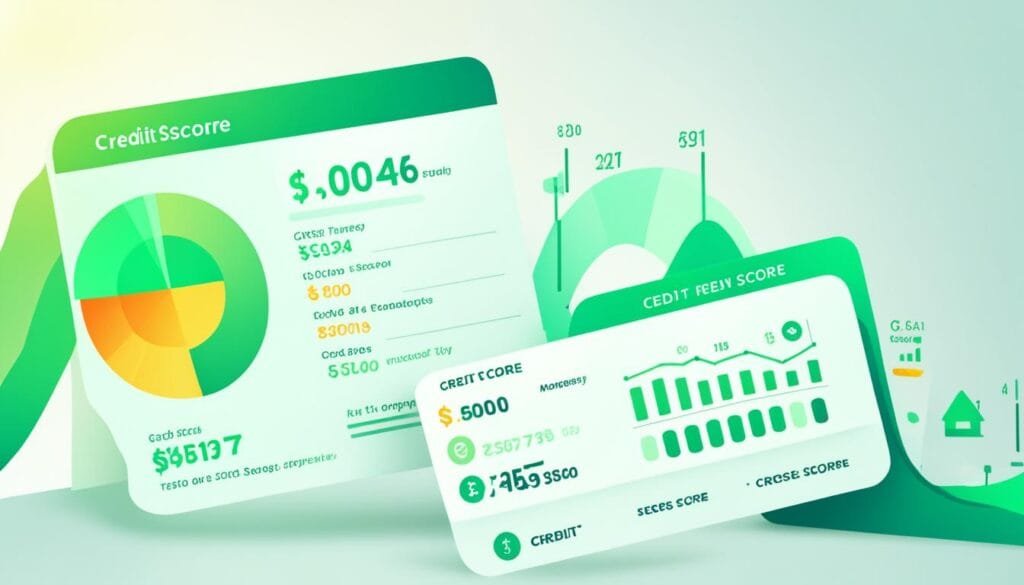Imagine this scenario: Sarah had always been responsible with her finances. She made on-time payments, kept her credit card balances low, and had a good mix of different types of credit. Her credit score was in the excellent range, and she felt confident about her financial future.
However, life threw a curveball her way. Sarah unexpectedly lost her job, and with it, her source of income. The bills started piling up, and she had no choice but to rely on her credit cards to make ends meet. As a result, her credit score took a significant hit. Sarah knew she needed to take action to rebuild her credit, but she wasn’t sure where to start.
Rebuilding a credit score is not an overnight process, but with the right strategies and determination, it is possible to recover from financial setbacks. In this article, we will delve into effective credit score rebuilding plans and provide you with the tools and knowledge you need to repair and improve your credit score.
Key Takeaways:
- Life events, such as job loss, can impact your credit score.
- Rebuilding a credit score takes time and effort.
- Understanding the strategies for credit score improvement is crucial.
- Consistency and responsible financial management are key for credit restoration.
- By following the right steps, you can rebuild your credit and secure a stronger financial future.
Understanding Credit Scores
A credit score is a numerical representation of an individual’s creditworthiness. It provides lenders with an assessment of the borrower’s likelihood to repay their debts. Understanding credit scores is crucial for anyone seeking to borrow money, whether it be for a mortgage, car loan, or credit card.
The most commonly used credit scoring system is the FICO score, developed by the Fair Isaac Corporation. FICO scores range from 300 to 850, with higher scores indicating a lower credit risk. Lenders rely on FICO scores to assess an individual’s creditworthiness and determine the terms and conditions of a loan.
Several factors influence credit scores, each playing a significant role in determining the overall score:
- Payment History: This is the most critical factor in credit scoring systems. It reflects whether a borrower has made payments on time and in full. A history of consistent, on-time payments demonstrates financial responsibility and positively impacts credit scores.
- Credit Utilization: This measures the amount of credit a borrower is using compared to their available credit limit. Keeping credit card balances low, preferably below 30% of the available credit, showcases responsible credit management and can boost credit scores.
- Length of Credit History: The length of time an individual has held credit accounts is taken into consideration. Generally, a longer credit history demonstrates stability and responsible credit usage, which can lead to higher credit scores.
- New Credit: Opening multiple new credit accounts within a short period can be viewed as riskier behavior. It’s important to manage new credit requests judiciously to avoid negatively impacting credit scores.
- Credit Mix: Lenders prefer to see a diverse mix of credit accounts, including credit cards, loans, and mortgages. Demonstrating the ability to handle various types of credit responsibly can contribute to a higher credit score.
By understanding these factors and their influence on credit scores, individuals can take the necessary steps to improve their creditworthiness. Maintaining a strong credit score opens doors to better borrowing opportunities and favorable interest rates.
https://www.youtube.com/watch?v=XluTM3ShTDE
Having a clear comprehension of credit scores and the factors that influence them is essential for financial success. As we delve deeper into credit scoring systems, we will explore strategies for improving credit scores in the next section.
Factors Influencing Your Credit Score
When it comes to understanding your credit score, it’s essential to know the factors that influence it. Your payment history and credit utilization play a significant role in determining your creditworthiness.
Maintaining a positive payment history by making consistent, on-time payments is crucial for a healthy credit score. Late payments or missed payments can have a negative impact on your creditworthiness.
Another important factor is credit utilization, which refers to the amount of credit you’re currently using compared to your total available credit. Keeping your credit card balances below 30% of the available credit limit is recommended to maintain a good credit score.
In addition to payment history and credit utilization, several other factors contribute to your credit score. The length of your credit history, the amount of new credit you apply for, and the diversity of your credit mix also play a role.
The length of your credit history reflects how long you’ve been using credit. Generally, a longer credit history is seen as more favorable as it provides a track record of financial responsibility.
New credit applications can have a temporary negative impact on your credit score, so it’s important to limit the number of new credit inquiries you make.
Having a diverse credit mix, which includes different types of credit such as credit cards, loans, and a mortgage, demonstrates your ability to manage different types of credit responsibly.
By understanding these factors and managing them effectively, you can positively influence your credit score and improve your overall creditworthiness.

Strategies for Improving Credit Scores
To improve credit scores and maintain good credit, it is essential to implement effective strategies. By following these strategies consistently, individuals can take control of their financial health and work towards achieving a better credit score.
Making Consistent, On-Time Payments
One of the most critical factors in improving credit scores is maintaining a record of consistent, on-time payments. Late or missed payments can have a significant negative impact on credit scores. By prioritizing timely payments, individuals demonstrate their financial responsibility and commitment to meeting their financial obligations.
Reducing Credit Card Balances
High credit card balances can adversely affect credit scores. To improve credit scores, it is crucial to reduce credit card balances and aim for a utilization rate of below 30%. This demonstrates responsible credit usage and can have a positive impact on credit scores over time.
Limiting New Credit Inquiries
Applying for multiple new credit accounts within a short period can raise concerns about an individual’s creditworthiness. Each new credit inquiry generates a ‘hard inquiry’ on the credit report, potentially lowering the credit score temporarily. To improve credit scores, it is advisable to limit new credit inquiries and only apply for credit when necessary.
Increasing Credit Limits Responsibly
Increasing credit limits can have a positive effect on credit scores, as it helps lower the overall credit utilization ratio. However, it is crucial to approach this strategy responsibly. Requesting frequent or excessive credit limit increases can raise concerns about potential credit dependency. It is essential to demonstrate a track record of responsible credit usage before requesting credit limit increases.
Handling Past Due Accounts
Past due accounts can significantly damage credit scores. It is important to address past due accounts promptly and work towards resolving any outstanding balances. Whether through negotiations with creditors, repayment plans, or debt restructuring, taking proactive steps to handle past due accounts can be instrumental in improving credit scores.
“Improving credit scores requires a combination of responsible financial habits and strategic decision-making.”
By implementing these strategies for improving credit scores, individuals can take charge of their financial well-being and pave the way for a more favorable credit profile. It is important to remember that good credit is built over time through consistent efforts and financial discipline.
| Strategies | Benefits |
|---|---|
| Making Consistent, On-Time Payments | – Demonstrates financial responsibility – Improves payment history – Boosts creditworthiness |
| Reducing Credit Card Balances | – Lowers credit utilization ratio – Improves creditworthiness – Minimizes risk of debt accumulation |
| Limiting New Credit Inquiries | – Prevents potential credit score decrease – Reduces risks associated with excessive credit applications |
| Increasing Credit Limits Responsibly | – Lowers credit utilization ratio – Demonstrates creditworthiness – Additional financial flexibility |
| Handling Past Due Accounts | – Resolves outstanding balances – Improves payment history – Minimizes negative impact on credit scores |

Conclusion
Improving your credit score requires responsible financial management and the implementation of effective credit rebuilding strategies. By following these strategies, you can work towards credit score improvement and achieve a stronger financial profile. This is essential for accessing better financial opportunities and securing a brighter financial future.
One of the key aspects of credit score improvement is making on-time payments. Consistently paying your bills and debts on schedule demonstrates reliability to lenders and positively impacts your credit score. Additionally, effectively managing your debts by reducing credit card balances can help improve your credit utilization ratio, another crucial factor in determining your creditworthiness.
Maintaining a positive credit history is also vital. Having a lengthy credit history showcases your ability to responsibly handle credit over time. Avoiding unnecessary new credit inquiries can further protect your credit score from potential negative impacts. Furthermore, increasing your credit limits responsibly and addressing any past due accounts can contribute to credit score improvement.
By implementing these credit rebuilding strategies and practicing responsible financial management, you can actively work towards improving your credit score and ultimately achieve your financial goals. Remember, credit score improvement takes time and consistency, but with dedication and discipline, you can rebuild your credit and secure a stronger financial future.
FAQ
What is a credit score?
A credit score is a numerical representation of an individual’s creditworthiness, ranging from 300 to 850. It is used by lenders to assess the risk of lending money to someone.
What factors influence credit scores?
Payment history, credit utilization, length of credit history, new credit, and credit mix are all factors that influence credit scores.
How can I improve my credit score?
To improve your credit score, you can make consistent, on-time payments, reduce credit card balances, limit new credit inquiries, increase credit limits responsibly, and address past due accounts.
Why is improving my credit score important?
Improving your credit score is important because it can give you access to better financial opportunities and help you secure a brighter financial future.
How long does it take to rebuild a credit score?
Rebuilding a credit score takes time and patience. It can take several months or even years to see significant improvement, depending on individual circumstances.
Source Links
- https://www.graygroupintl.com/blog/credit-score-improvement
- https://www.usbank.com/financialiq/manage-your-household/establish-credit/Improve-your-credit-score-Truth-myths-revealed.html
- https://www.bhfs.com/insights/alerts-articles/2023/fhfa-commits-to-flexible-timeline-for-transitioning-credit-score-model-validation

